The legal profession, based on tradition and precedent, is one that is being dramatically changed by the introduction of artificial intelligence. As technology evolves, lawyers continue finding ways in which tools based on AI are going to be helpful in their work through up-rating their efficiency and better serving their clients.
Related to the practice of law, these 12 Best AI tools for lawyers are transforming areas from steps in legal research, contract analysis, prediction of cases, and automation of documents.
Overview of AI in the legal industry
AI tools for lawyers are software systems that leverage artificial intelligence technologies such as machine learning, natural language processing, and predictive analytics for different legal operations.
They may analyze giant bulks of data, point out patterns, and bring out conclusions that, for humans, are either laborious or even impossible to complete manually. Some of the ways the software is used:
- Legal research and examination of precedents, case law.
- Decision-making.
- Due diligence
- E-discovery
- Prediction of case outcomes
- Automation and drafting of documents
- Management of intellectual property
- Billing and timekeeping
Why Lawyers Should Use AI tools
Artificial intelligence (AI) has rocked many industries, and the legal profession is no different. The AI tools in use by lawyers are becoming more advanced and numerous every other day, and the advantages to legal practice accrued from these tools are not to be taken for granted.
Here are enough reasons why lawyers should be using AI tools:
1. Increased Efficiency
AI tools can automate many time-consuming tasks, such as document review, legal research, and contract analysis. This automation allows lawyers to focus on higher-value activities that require human judgment and expertise.
2. Enhanced Accuracy
They deal with colossal volumes of data consistently and without errors, well beyond human capacity. This reduces the risk of the oversight paradox and making a mistake in repetitive tasks.
3. Cost Reduction
AI tools for lawyers applied to streamline processes take away routine or repetitive tasks that may be employed within the legal processes; they, therefore, help the law firms reduce costs. This, in turn, could lead to price competitiveness to the clientele and improved profitability for the firm.
4. Better Legal Research
AI tools for legal research can analyze millions of cases and legal documents in seconds and, as part of the result, provide the researcher with personalized findings of much greater depth compared to any human researcher in a fraction of the time.
5. Predictive Analytics
To the extent that legal AI tools are developed based on large data sets of historical case data, the tool itself can predict potential verdicts and compare this with similar cases to give attorneys the best options pertaining to alternatives and what strategic steps to take regarding the case at hand.
6. Better Contract Management
AI can quickly comb through contracts, extract key pieces of information, and make the due diligence and management of contracts more efficient and complete.
How to Choose The Perfect AI Tool for Lawyers
1. Specific Needs and Goals
Define specifically, first of all, the needs and aims your firm specifically has. What particular tasks or processes would you like to have seen through in a different lens?
AI tools differ in their level of expertise in handling different kinds of things, so it’s important to have that awareness.
2. Accuracy and Reliability
The tool must have been proven to be accurate. Look for independent appraisals or case studies showing the reliability of the tool in real-world legal situations.
3. Ease of Use and Integration
Make sure that the solution is user-friendly and can easily be integrated into your current systems and workflows without a steep learning curve, as steep learning curves discourage the adopter and reduce the effectiveness of the tool.
4. Customization and Flexibility
Look for a solution that can be properly customized for your practice areas and client needs in particular. The ability of the AI solution to be trained on the unique data of your firm can be of immense value.
5. Data Security and Privacy
Ensure this AI tool meets requirement regulations for data protection and contains adequate security, since the information has to do with legal details.
6. Transparency and Explainability
Outputs or decisions should be clearly explainable from the tool. This condition is quintessentially vital in the legal field—a landscape where the reasons behind taken decisions can be as significant as the decisions themselves.
Top 12 AI Tools for Lawyers
Here is the list of top AI tools for lawyers in India:
1. CaptureNow

CaptureNow is a highly innovative AI tool for law students that streamlines the process to capture and organize legal information with an infusion of advanced natural language processing to automatically extract key details from different legal documents, including contracts, court filings, and client communications.
In just a few seconds, CaptureNow extracts features of interest from a body of text, thus saving thousands of hours and improving the quality of documents reviewed by the busy legal professional.
An additional capability is the efficient way of managing information as well as its retrieval for use by the lawyer.
Key Features:
- Auto-extract relevant information from legal document sets
- Smart categorization and tagging system
- Integration with popular legal document management systems
- Real-time editing and sharing features
Reasons to buy:
- Drastically lessens review time of documents
- Increased accuracy in capturing information
- More organized legal information
Cons:
- Will take some learning time for maximum efficiency
- Quality may vary with complicated documents
- Not much room for customization in small firms
Price: Subscription-based pricing. Starts at $99/month per user
Website: www.capturenow.ai
2. Casetext
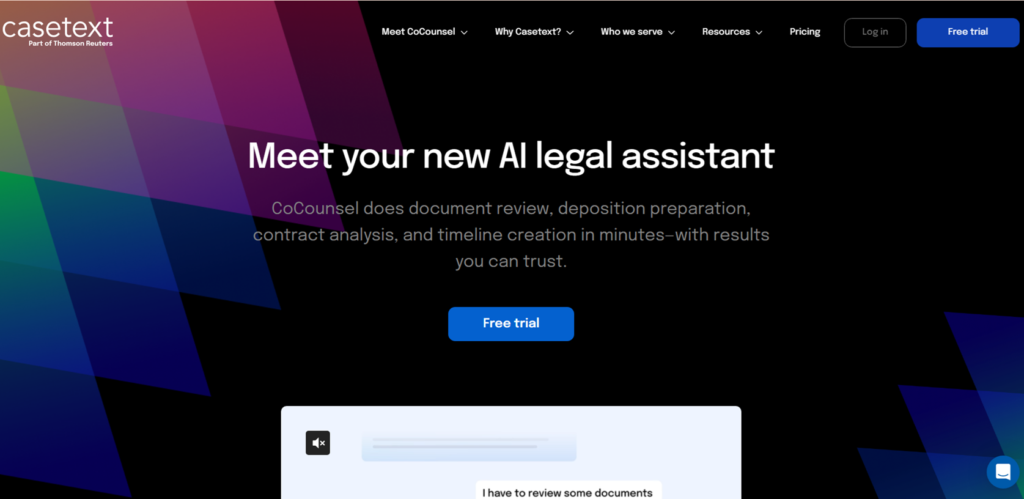
Casetext is an all-in-one AI technology-imbued legal research platform that has revolutionized the way attorneys find and cite case law. Its breakthrough feature, CARA A.I., has the capability of analyzing legal documents to suggest relevant cases, statutes, and secondary sources. How does it do that?
It doesn’t stop at general keyword matching but rather identifies the context and legal issues surrounding each question to provide more meaningful and useful results.
The platform also tends to expand its services to include a citator service and a broad store of legal documents, which makes this one spot for legal research.
Key Features:
- CARA A.I. for context-sensitive legal research
- Parallel Search for conducting multi-jurisdictional research
- SmartCite citator service
- deep repository of case law, statutes, and other legal and non-legal literature
Reasons to buy:
- Time-saving features in doing legal research
- tertiary content and a wide scope of coverage related to the topic
- it offers functionalities, that are not typically found in other legal research platforms
Cons:
- A learning curve on habitual ways of conducting research at law firms
- It might be less comprehensive in some areas of the law practice.
- A subscription-based service that is course-based, fans with no internet access
Pricing: Subscription-based, starting at around $65 per user per month
Website: www.casetext.com
3. PatentPal
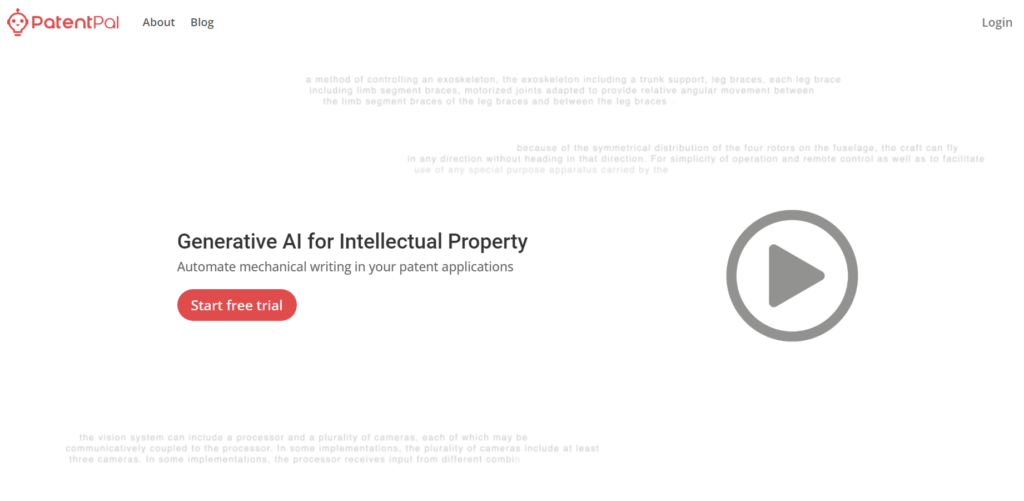
PatentPal automates mechanical writing in patent applications through the use of generative AI. By saving them time and effort while drafting patent applications, it can be helpful for attorneys.
Attorneys can input their claims into PatentPal by simply dropping a document into the browser; a single click will produce the specification and figures. You can export the created document into Word and Visio (or PowerPoint).
This facilitates rapid access to legal material, which can save attorneys a great deal of time and effort. Lawyers who have utilized PatentPal have left positive feedback.
Key Features:
- Vast-scale litigation analytics
- Judge and attorney performance scores
- Case outcomes predicting
- Custom alerts monitoring cases
Reasons to buy:
- Provides data-derived insights into litigation strategies
- Competitive intelligence regarding opposing counsel and parties.
- Inform decisions about case management
Cons:
- Demands detailed interpretations when using it to avoid misreading
- Expensive for smaller firms and solo practitioners.
Pricing: By quote, adding your own specific data and needs.
Website: www.lexmachina.com
4. ChatGPT
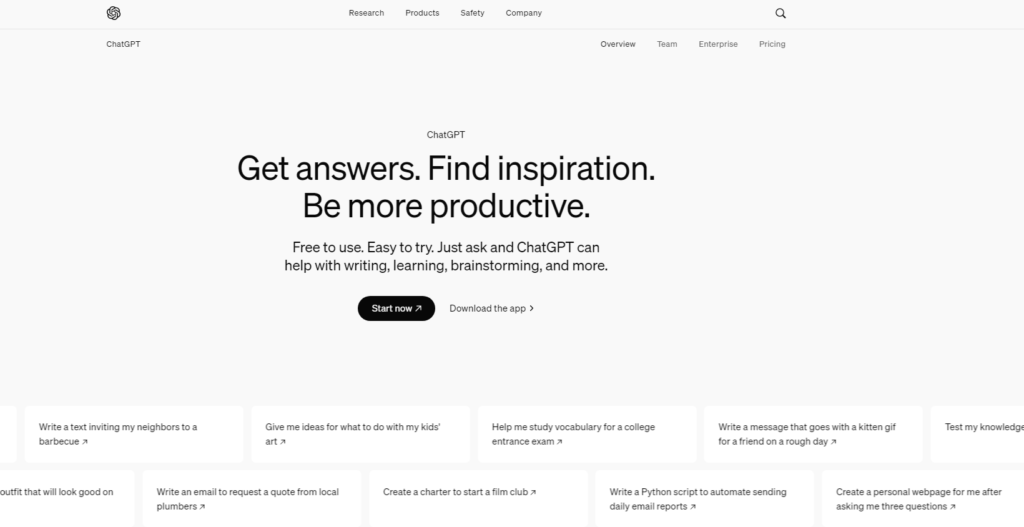
Even though ChatGPT is not specific to the law, it has still found significant application in the legal sector.
This state-of-the-art language model is expected to augment the productivity of any legal practitioner through activities that range from text composition applications and the summarization of research to the generation of arguments.
Its versatile use in several other forms of legal writing tasks should come from understanding and generating human-like text.
But remember: use ChatGPT only as a sort of assistant because it is not capable of replacing a professional’s opinion or proofreading by a legitimate lawyer.
Key Features:
- Natural language processing for text generation
- Comprehension and response to complex questions
- Multilingual capabilities
- Learning and improving repetitively with every reply
Reasons to buy:
- High first-draft delivery for text
- Idea creation and brainstorming
- Summarizes complex information quickly
Cons:
- Not specifically trained in the area of law and it can make unreliable facts or information.
- Established outputs need to be reviewed and fact-checked.
- Sensitive information is retained under privacy and security conditions.
Pricing: Free for a standard version and subscription ChatGPT Plus
Website: www.openai.com/chatgpt
5. Relativity
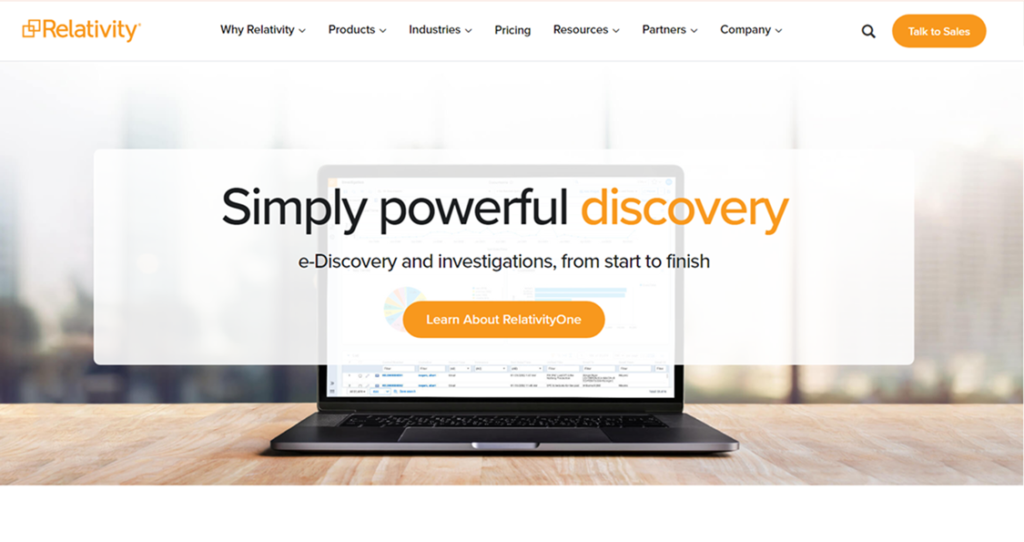
Relativity is a powerhouse AI-enabled e-discovery platform that enables the process for the review of electronic documents and their relevancy.
Document tagging, ideation patterns, and relevancy ranking are all functions that could be achieved through the assist of machine learning capabilities.
The use of machine learning and AI power in Relativity can save thousands of hours and an amount of money in substantiating most relevant and irrelevant documents while reviewing large collections of them in a case of litigation or investigation.
The platform also comes bundled with numerous advanced analytics capabilities that will help attorneys identify the latent connections and insights in vast data sets.
Key Features:
- AI-based review and analysis of documents
- Advanced search with analytics functions
- They are completely customizable in workflows
- It can be used on a secure cloud, or on-premise operation
Reasons to buy:
- Drastically speeds up the discovery processes
- Significantly reduces document review costs
- Improves accuracy in identifying documents
Cons:
- Setup can get complex
- Usage of it requires a huge upfront investment in terms of time and resources
- Would be overkill on small cases or firms
Pricing: Custom pricing depending on data volume and required features
Website: www.relativity.com
6. Everlaw
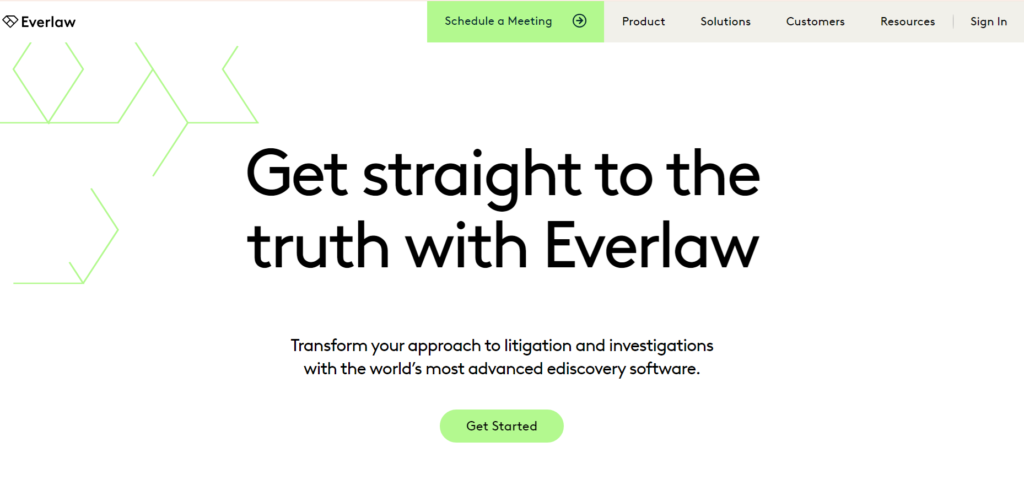
Everlaw is the cloud-based eDiscovery and litigation platform that applies artificial intelligence for handling large-scale litigations—applications like predictive coding for document review, audio and video transcription, and smart threading of emails.
Everlaw is built from scratch to be easy to use and to have powerful collaboration tools in use for very complex, multi-party litigations.
The platform also hosts strong data visualization capabilities, allowing lawyers to easily see trends and patterns within large datasets.
Key Features:
- Predictive coding through AI in document review
- Audio and video automatically transcribed
- Advanced Data Visualization
- Security features in cloud-based collaborative applications
Reasons to buy:
- This will shorten the e-discovery process.
- Increased collaboration on complex litigations
- High-powered analytics to develop strategies to handle the case.
Cons:
- Requires an internet connection to access it.
- It is very demanding in terms of expertise; hence, non-tech-savvy professionals may have difficulty.
- Pricing may be a bit high for smaller companies or solo practitioners.
Pricing: Custom pricing depending on the volume of data and the number of users
Website: www.everlaw.com
7. LawGeex
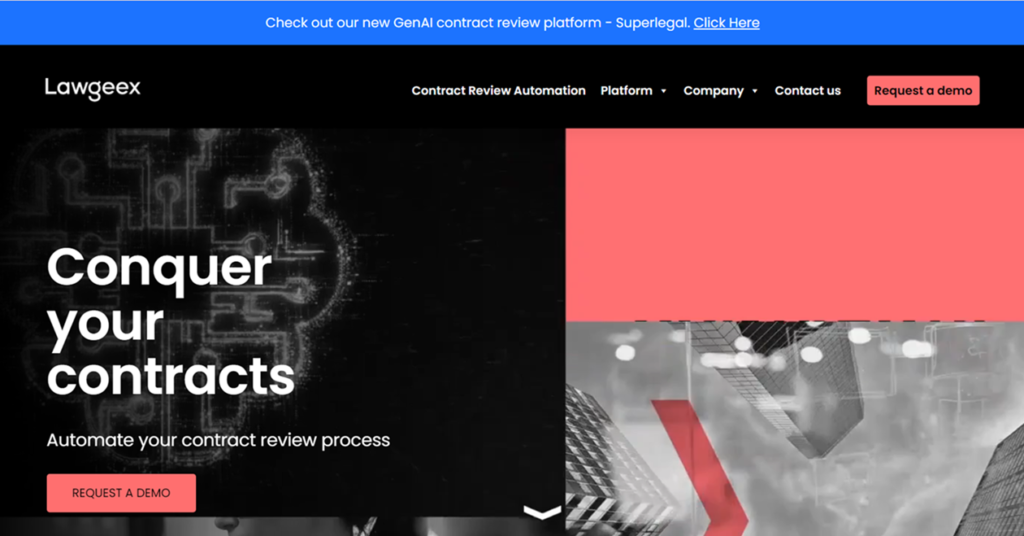
The AI-powered contract review and automation platform LawGeex helps in speeding up the process. Preprogrammed with machine learning algorithms, the software autonomously peruses the contracts and highlights the issues, making suggestions for changes in line with pre-defined legal policies.
It cuts down by many hours the number of hours lawyers have to spend on routine reviews, ensuring that they have more time free to do other kinds of legal work.
Companies will find the solution specifically useful for physician loads and commercial documents handled in-house by the legal departments of most of them.
Key Features:
- Automation-led contract review and analysis
- Customizable legal policies and playbooks
- Working capability with common contract management systems
- In-depth reporting and analytics
Reasons to buy:
- Drastically reduces the time taken in the review
- Increases consistency in analysis
- Finds time for lawyers to get exposed to other tasks of better value
Cons:
- Can have to be made chatty about specific contract types with much fine-tuning
- Can’t be used for very specialized or very uncommon kinds of contracts
- Legal policies under it need to be monitored from time to time and Updated.
Pricing: Custom pricing according to contract volume and complexity
Website: www.lawgeex.com
8. Legalese Decoder

An AI legal research assistant online tool called Legalese Decoder converts complicated legal documents into understandable English, making them easier to understand.
By saving them time and effort when interpreting and elucidating legal documents to their clients, it can be helpful for lawyers.
The application makes it simpler for attorneys to comprehend and explain the content of legal documents to their clients by using natural language processing technology to translate complex terminology into simple English.
Any web browser can be used to visit Legalese Decoder, which is free to use. Numerous legal papers are supported by it, such as leases, agreements, contracts, and more.
Key Features:
- Real context in legal research.
- Summarizes cases automatically.
- Checks and validates the citations.
- Integration with almost all leading legal research databases.
Reasons to buy:
- Cuts drastically required in the laborious research that students do.
- 100% voluminous and fitting research results
- Digest the gist of cases in full much faster
Cons:
- Might require getting used to by some users
- How advanced the query is could variate on result’s accuracy
- Some expensive for a single practitioner
Website: www.legalesedecoder.com
Pricing: Free plan available
9. Smith.ai
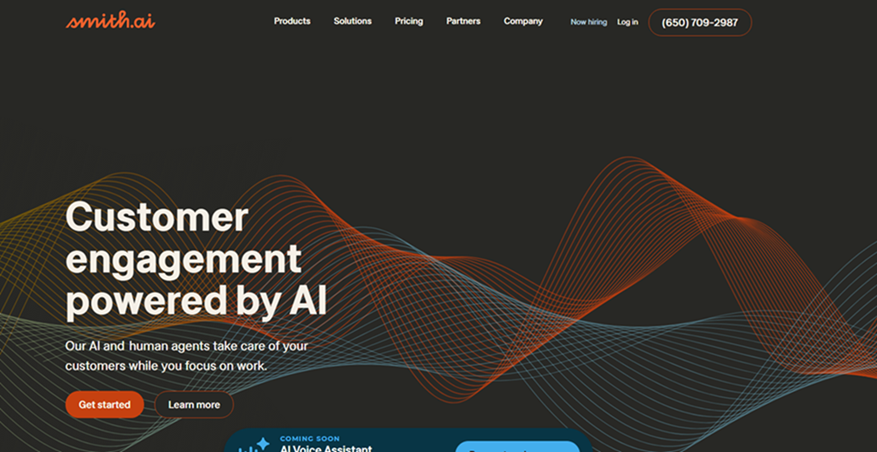
Smith.ai fits as an artificial intelligence-based virtual chat or receptionist tool that is relatively ideal, more so for law firms. It utilizes natural language processing to process client intake, scheduling an appointment, and simple legal inquiries.
Information can transition smoothly with leading software in legal practice management because Smith.ai is able to integrate. The service can manage calls, texts, and web chats, providing 24/7 coverage for law firms.
Smith.ai automates repeatable client service so that lawyers have the ability to concentrate on more complex legal work with the assuredness of all potential clients being responded to.
Key Features:
- AI-powered call and chat handling
- Automated appointment scheduling
- Custom intake scripts
- Legal practice management software integration
Reasons to buy:
- Make the firm more responsive to clients
- Save attorneys’ and staff’s time
- Support 24×7 coverage for client inquiries
Cons:
- May be unable to manage smartly complicated or subtle inquiries of clients
- Needs proper setup to relate correct information
- Monthly costs could mount up significantly at high-volume firms
Pricing: $240 per month for 30 calls or chats.
Website: www.smith.ai
10. HarveyAI
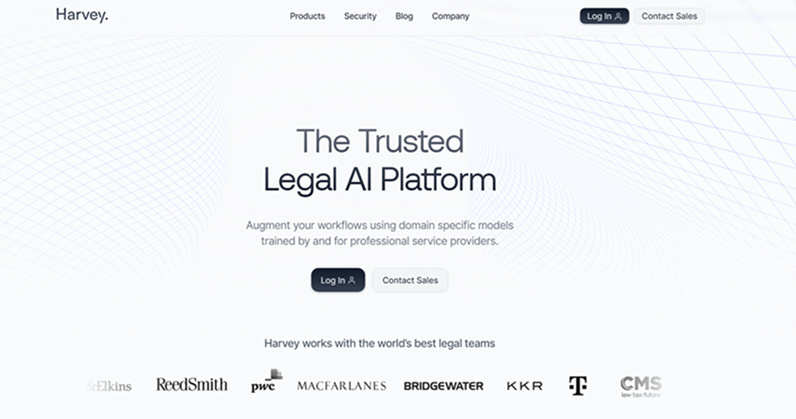
HarveyAI is an AI tool built for legal professionals. Created using large language models and advanced machine learning techniques, HarveyAI seriously accelerates legal research, document creation, and case analytics.
It understands the complexity of the structure within legal queries and responds with a contextually rich answer in most cases. It can also support multiple features, such as document summarization, contract analysis, and, essentially, it aids in the laying down of the legal strategy.
HarveyAI learns and adapts to one’s area of law, making it a great enabler for law firms to increase their efficiency and capacity.
Key Features:
- Artificial intelligence in legal research and analysis
- Automated draft and review of documents
- Summarization and analysis of case law
- Can be tailor-made into narrow areas of laws
Reasons to buy:
- Tremendously boosts productivity in several legal works
- Gives fast access to relevant legal information
- Aid in devising legal strategies
Cons:
- Requires rigorous verification of the information put out by the AI
- High learning curve for a few of the users
- Relatively high cost of subscription for small firms
Pricing : Custom and depends on the usage and operational size of the firm
Website : www.harvey.ai
11. Law.co
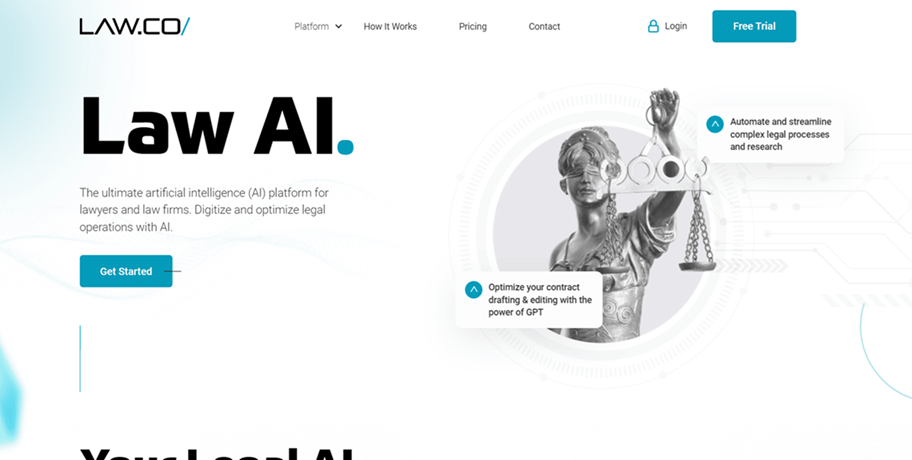
It is another AI tools for lawyers. It is an Artificial intelligence-based legal tech platform that provides tools to be used in law firms/litigation departments. The tools are to do with document automation, contract analytics, and legal research support.
Law.co uses machine learning algorithms to understand what is within a set of legal documents and extract the most critical pieces of data, therefore being much more focused on contract review and due diligence workflows.
Collaboration tools are available on this platform to support legal teams working flawlessly on intricate projects. The workflows are designed for easy understanding and, as such, can be adapted for use in different kinds of legal practices. This AI lawyer tool is famous for effective work results.
Key Features:
- Automation of documents
- Understanding of contracts and review
- AI for legal drafting in India help in research
- Collaboration and project management
Reasons to buy:
- Streamlines a range of legal workflows
- Improves the efficiency of document review
- Best designd to optimize team collaboration on legal issues
Cons:
- Setup and customization have a learning curve
- More useful in some practice areas than in others
- Subscription can become expensive on larger teams
Pricing: By subscription; custom-priced
Website: www.law.co
12. Ferret
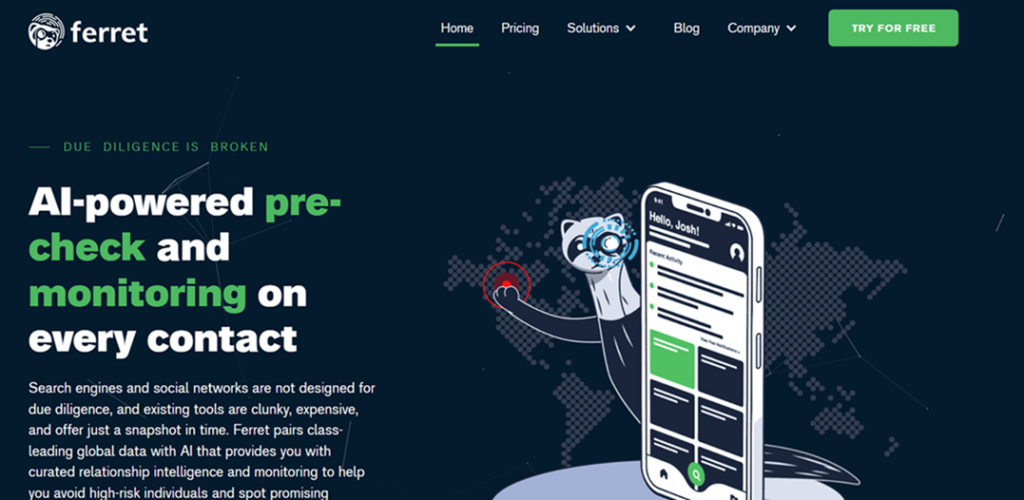
An AI-powered program called Ferret.ai gives customers access to exclusive relationship intelligence. It can assist attorneys in avoiding risky people and identifying advantageous situations.
The app provides due diligence technology to safeguard users’ financial, social, and professional interests.
It can assist attorneys in learning about embezzlement, bribery, corruption, money laundering, fraud, tax evasion, and sanctions.
Key Features:
- AI-driven case valuation
- Predicted ranges for settlements
- Demand tool letter generation
- Automated demand tool letter
Reasons to buy:
- Provides insight into valued cases through data
- Settlement expectations are transparent and realistic
- Judgment of reasonableness is transparent and realistic
- Time-saving on negotiations
Cons:
- Must be applicable to personal injury cases
- Valuations can be difficult to interpret
- Inability to capture unique qualities of the event
Pricing: Subscription-based starting at $99 monthly.
Website: www.evenup.com
Suggested Read:
AI Tools for UI/UX Designers
AI Tools for Coding
Final Words
These 12 Best Ai tools for lawyers are the applications of that wide set of applications which serve to enhance a wide set of applications dealing with different aspects of law practice. From research and document review to client interaction and case valuation, these tools prove the growing impact of AI in the legal sector.
While each tool provides its specific benefits, it is equally important for lawyers to evaluate their specific needs and the tool’s limitations cautiously before implementation.
In terms of future developments in AI, there is an expectation that they will only become more refined and, of course, further change the practice environment for the legal profession.
FAQs
1. Can these AI tools be applied to any activity within a legal practice?
Most are general-purpose and apply across all activities, but some are vertically specific. Check the feature set of each app with your activities in mind.
2. Do these AI tools have a user-friendly interface and adequate functionality for use even without technical acumen?
Most of these systems have a user-friendly interface. Of course, there is always a learning curve with any. Fortunately, most vendors also provide sufficient training and support by which attorneys can acquire a working knowledge of these.
3. Does this mean that with such AI tools entering law service, humans would become entirely dispensable in law service?
By all means no. The software is just meant to aid and work alongside the attorney but not replace them. There is still a human aspect to the greater part of the legal process.
4. Top free AI tools for lawers.
Top AI tools for lawyers are Harvey ai, Legal Robot, DoNotPay, Blue J L&E etc.



